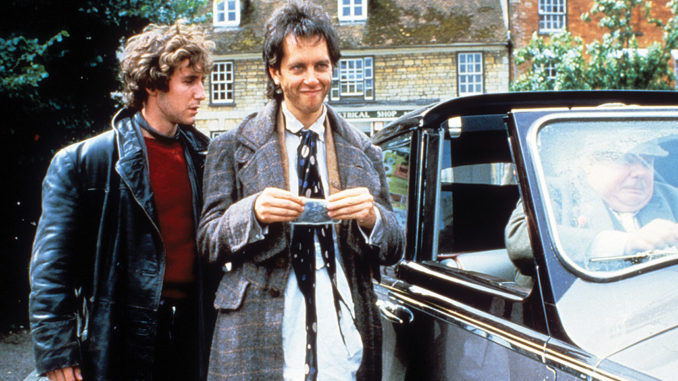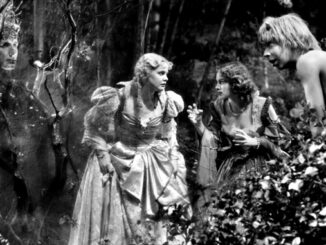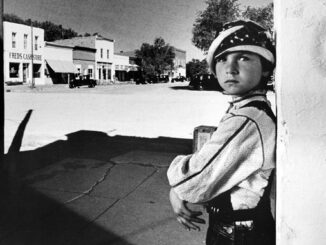
by Giles Gordon
Frankly, my dear, I don’t give a damn.” “We’re gonna need a bigger boat.” “Mrs. Robinson, you’re trying to seduce me.” “Get in the back of the van!”
The first three quotations above will be familiar to any movie fan. The films they come from are a part of our collective consciousness. The last quote may be less recognizable to many, but to a small and fiercely loyal fan base, it has equal power. The line comes from the film Withnail and I, and is one of dozens joyfully burned into the memory of each and every one of its rabid devotees, of which I proudly count myself a member.
I first saw Withnail and I in my teens, at school in England in the middle of a roaring, rebellious adolescence. A fan of such books as Hunter S. Thompson’s Fear and Loathing in Las Vegas, I immediately embraced this film’s seedy hedonism, as did my fellow schoolmates. Withnail and Marwood’s marginal existence and wild behavior appealed to the rebel in me. My friends and I would quote the film’s lunatic dialogue back and forth joyfully. These lads were living on the edge, in that quintessential counter-establishment decade, the 1960s. Everything about them––their boozing and chain smoking, Marwood’s dilapidated Jaguar MK2, even their suffering––struck a chord with me.
As time has passed, what now resonates with me is this film’s beautifully observed depiction of a friendship… They have lived with the carefree élan of youth, before jobs and wives and responsibility. But as the film opens, it is clear that the party is over. The film examines how two men react to this sobering reality.
So taken with these men was I that I scoured London’s flea markets and boot sales for a beat-up leather trench coat just like Marwood’s. But as I have grown older, the film’s appeal has become more complex. No doubt about it, this is a very funny film––and its comedy is what first drew me to it. But it is more than just the string of lunatic comedic moments; it also examines themes of friendship and growing up that have appealed to me more and more as I have grown older myself.
Withnail and I opens in London in 1969. It follows the lives of two unemployed young actors over a couple of weeks: Withnail, played by Richard E. Grant in a role that brought him early acclaim, and “I” (Marwood in the screenplay but not the credits), a pitch-perfect performance by Paul McGann. The film was written and directed by Bruce Robinson, and the story was based to a large extent on an amalgam of experiences he had as a struggling actor in the late ‘60s.
Withnail and Marwood are living in the ruins of what once must have been a perfectly nice apartment, without heat to fend off the brutal cold of a London spring. The neglected kitchen sink may or may not contain a malignant life form. Various lowlifes drift in and out of the flat. At this point, the boys are strung out on a combination of chemicals, and the physical and mental strain is beginning to take its toll. As Marwood so eloquently puts it, “We are indeed drifting into the arena of the unwell.” They long for the opportunity to straighten themselves out but, unemployed and flat broke, they seem to be out of options. Salvation comes in the form of a country cottage owned by Withnail’s rich and wildly eccentric Uncle Monty (played brilliantly by Richard Griffiths). The two men flee London, and what follows is one of the great road movies in history.
As time has passed, what now resonates with me is this film’s beautifully observed depiction of a friendship. Withnail and Marwood have clearly shared a great deal together, and undoubtedly the past times have been very good. They have lived with the carefree élan of youth, before jobs and wives and responsibility. But as Withnail and I opens, it is clear that the party is over. The film examines how two men react to this sobering reality. Marwood clearly loves Withnail, but he sees that things must change, and that he is growing apart from his old friend. In spite of this devotion, he is determined to move forward. Withnail, on the other hand, seems desperately to be holding on to the last scraps of the good old days.
For all the film’s depravity and abuse, and for all the misery that Withnail and Marwood endure, this film has the remarkable feeling of a cherished memoir. Clearly, this is a time that Robinson looks back on fondly. In reality, the man on whom Withnail is based never was able to move forward, and he died too young. He was a man with a potential never realized. But from a distance, Robinson has been able to distill his experiences into moments of pure comedy, tempered with a sweet melancholy. The result is that rarest of films; it continues to surprise and delight me each time I see it.





